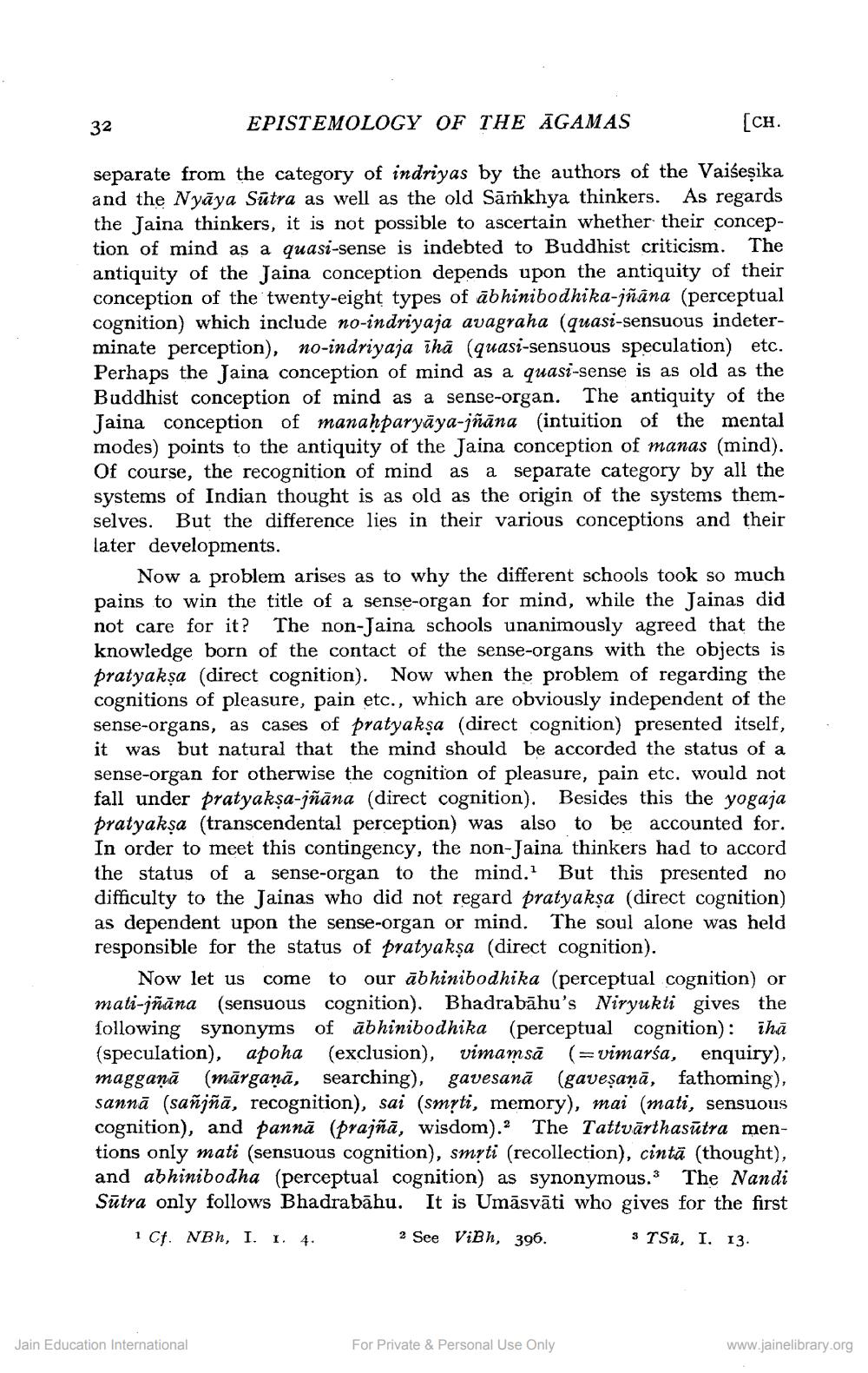________________
32
EPISTEMOLOGY OF THE AGAMAS
[CH.
separate from the category of indriyas by the authors of the Vai esika and the Nyāya Sutra as well as the old Sārkhya thinkers. As regards the Jaina thinkers, it is not possible to ascertain whether their conception of mind as a quasi-sense is indebted to Buddhist criticism. The antiquity of the Jaina conception depends upon the antiquity of their conception of the twenty-eight types of abhinibodhika-jñāna (perceptual cognition) which include no-indriyaja avagraha (quasi-sensuous indeterminate perception), no-indriyaja ihã (quasi-sensuous speculation) etc. Perhaps the Jaina conception of mind as a quasi-sense is as old as the Buddhist conception of mind as a sense-organ. The antiquity of the Jaina conception of manahparyāya-jñāna (intuition of the mental modes) points to the antiquity of the Jaina conception of manas (mind). Of course, the recognition of mind as a separate category by all the systems of Indian thought is as old as the origin of the systems themselves. But the difference lies in their various conceptions and their later developments.
Now a problem arises as to why the different schools took so much pains to win the title of a sense-organ for mind, while the Jainas did not care for it? The non-Jaina schools unanimously agreed that the knowledge born of the contact of the sense-organs with the objects is pratyaksa (direct cognition). Now when the problem of regarding the cognitions of pleasure, pain etc., which are obviously independent of the sense-organs, as cases of pratyaksa (direct cognition) presented itself, it was but natural that the mind should be accorded the status of a sense-organ for otherwise the cognition of pleasure, pain etc. would not fall under pratyakşa-jñāna (direct cognition). Besides this the yogaja pratyaksa (transcendental perception) was also to be accounted for. In order to meet this contingency, the non-Jaina thinkers had to accord the status of a sense-organ to the mind.. But this presented no difficulty to the Jainas who did not regard pratyakşa (direct cognition) as dependent upon the sense-organ or mind. The soul alone was held responsible for the status of pratyaksa (direct cognition).
Now let us come to our ābhinibodhika (perceptual cognition or mati-jñāna (sensuous cognition). Bhadrabāhu's Niryukti gives the following synonyms of abhinibodhika (perceptual cognition): ihā (speculation), apoha (exclusion), vimamsă (=vimarśa, enquiry), magganā (mārganā, searching), gavesanā (gaveșaņā, fathoming), sannā (sañññā, recognition), sai (smrti, memory), mai (mati, sensuous cognition), and pannā (prajñā, wisdom).2 The Tattvārthasūtra mentions only mati (sensuous cognition), smrti (recollection), cintā (thought), and abhinibodha (perceptual cognition) as synonymous. The Nandi Sūtra only follows Bhadrabāhu. It is Umāsvāti who gives for the first
1 Cf. NBh, I. 1.4.
2 See Vibh, 396.
3 TSü, I. 13.
Jain Education International
For Private & Personal Use Only
www.jainelibrary.org




